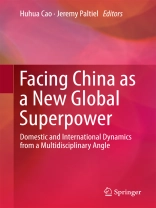This book brings together diverse perspectives from the newest generation of scholars from Canada and China to better understand China in the 21st century. It examines China’s socio-political structure, its particular relationship with Canada, and interaction with the international community; and discusses how to overcome the ideological differences between the two countries to establish positive and sustainable Canada-China bilateral relations for the future. Importantly, the perspectives are from young authors, with a different relationship to China (and Canada) than more established authors. This compilation helps breathe new life into the study of Sino-Canada relations from both countries, and to reassess and re-frame issues related to China in the 21st century.
Содержание
A Vision of Modernity: Menglong Poetry from 1978-1983.- Guanxi (关系) Dynamism: The Changing Role of Guanxi in Eastern Chinese villages.- Enshrining a “National Hero”: Contending Visions and Distorted Memories of the Blue Glow Palace in Twentieth-century Taiwan.- Corporatist Representation via People’s Congress: An Aspect of the State-society Relationship in Contemporary China.- Development of Community-Based Social Service Organizations in Contemporary China.- A Chinese approach to land rights: Property law and Chongqing’s policy experiment on urban-rural integration.- Challenges Facing China’s Urban Development in the New Era.- Death Penalty in China and Its Impact on Sino-Canadian Criminal Justice Cooperation.- Educational Equity in the Access to Post-secondary Education
A Comparison of Ethnic Minorities in China with Aboriginals in Canada.- Changing practices and shifting perceptions: Chinese immigrants “integrating” into the engineering profession in Canada.- Toronto’s Literary Chinatowns: The Construction of Chinese Canadian Identities.- Building Shanghai as an International City: Best practice.- Access, Assurance and Acceptance: Moving beyond the status-quo/revisionist power debate in investigating China’s emerging foreign policy strategy.- Orbits of Influence: The Sino-Indian Waltz in South/Southeast Asian New Regionalism.- Development Cooperation in an Era of Chinese Involvement: The Case of Rice Projects in Mali.
Об авторе
Huhua Cao is a Full Professor in the University of Ottawa’s Department of Geography specializing in urban geography, with the use of geostatistical methods and Geographic Information Systems (GIS). In recent years, Dr. Cao’s research has focused on engaging urban indigenous and ethnic minority people in urban contexts using e-participation methods. He has directed numerous international research projects that have received funding from the Social Sciences and Humanities Research Council of Canada (SSHRC), the Canadian Institute of Health Research (CIHR), the Canadian International Development Agency (CIDA), Human Resources and Skills Development Canada (HRSDC), the International Development of Research Centre (IDRC), the European Union and the Government of China. Professor Cao has also written numerous articles and books related to urban and regional development while collaborating with academics throughout the world. The Sino-Canadian relationship is another research interest of Professor Cao. In 2011 he published The China Challenge: Sino-Canadian Relations in the 21st Century with former Senator Vivienne Poy. China Challenge was selected as one of the 20 most important books in foreign policy in 2011 by Embassy Newspaper.
Jeremy Paltiel is Professor of political science at Carleton University in Ottawa and was visiting professor at the department of international relations at Tsinghua University in Beijing in 2009.
He received his BA in East Asian Studies from the University of Toronto in 1974, diploma in Philosophy from Peking University in 1976 and his MA (1979) and Ph D (1984) in political science from the University of California, Berkeley. He has published widely on China and its foreign relations. This includes articles on human rights and the Chinese culture, the elite politics of the Chinese Communist Party, Civil-Military relations and Sino-Canadian relations. He co-ordinated the Chinese domestic background theme of the Canadian International Council’s China Working Group and authored two of its papers: “Canada in China’s Grand Strategy” and “Structure and Process in China’s Foreign Policy Making – implications for Canada.” More recently he published “Reimagining Canada’s Present and Future in the Shadow of China’s Rise, ” the concluding chapter in Huhua Cao and Vivienne Poy eds., The China Challe
nge: Sino-Canadian Relations in the 21st Century. He is the author of The Empire’s New Clothes: Cultural Particularism and Universality in China’s Rise to Global Status (Palgrave, 2007) and “Mencius and World Order Theories”(2010), “China’s Regionalization Policies: Illiberal internationalism or Neo-Mencian Benevolence?” (2009) “Peaceful Rise? Soft Power? Human Rights in China’s New Multilateralism”(2007). In 2014 he was awarded an SSHRC Insight grant in the amount of $425, 000 to study Canada’s relations with China and the Asia-Pacific.












